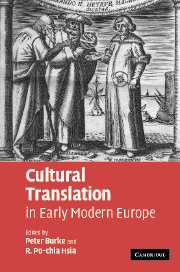Book contents
- Frontmatter
- Contents
- Notes on contributors
- Introduction
- PART I TRANSLATION AND LANGUAGE
- PART II TRANSLATION AND CULTURE
- PART III TRANSLATION AND SCIENCE
- 9 The role of translations in European scientific exchanges in the sixteenth and seventeenth centuries
- 10 Scientific exchanges between Hellenism and Europe: translations into Greek, 1400–1700
- 11 Ottoman encounters with European science: sixteenth- and seventeenth-century translations into Turkish
- 12 Translations of scientific literature in Russia from the fifteenth to the seventeenth century
- Bibliography
- Index
10 - Scientific exchanges between Hellenism and Europe: translations into Greek, 1400–1700
Published online by Cambridge University Press: 27 July 2009
- Frontmatter
- Contents
- Notes on contributors
- Introduction
- PART I TRANSLATION AND LANGUAGE
- PART II TRANSLATION AND CULTURE
- PART III TRANSLATION AND SCIENCE
- 9 The role of translations in European scientific exchanges in the sixteenth and seventeenth centuries
- 10 Scientific exchanges between Hellenism and Europe: translations into Greek, 1400–1700
- 11 Ottoman encounters with European science: sixteenth- and seventeenth-century translations into Turkish
- 12 Translations of scientific literature in Russia from the fifteenth to the seventeenth century
- Bibliography
- Index
Summary
THE LAST BYZANTINE DECADES
The fifteenth century is the century of the shift of power in the Balkans and Asia Minor, from the declining Byzantine to the rising Ottoman Empire. As Byzantium lost lands and power, its emperors looked forward more and more to help from Western Europe against Ottoman military conquest. In order to motivate Catholic Europe to assist the Orthodox ‘heretics’, a plan for the union of the two main European Christian Churches was put forward, and discussions organized between them. A side effect of these contacts was an intensive cultural exchange between the two sides, and as far as concerns science, the exchange of manuscripts and in some cases their translation as well.
During the last Byzantine dynasty of the Palaiologues, state officials and scholars belonged to the same milieu. To rise in the state hierarchy, studies were virtually obligatory. Officials usually followed high-level courses, studying the trivium (grammar, logic and rhetoric) and the quadrivium (music, arithmetic, geometry and astronomy). The training of these officials and the important position that what we call ‘science’ gained during this last Byzantine dynasty, led them to discuss natural philosophy rather than politics.
Indeed, political and religious debates between rivals trying to obtain the same high state office sometimes turned into scientific discussions. Moreover, appointments to some important political offices were made following scientific debates, as in the case of Metochites and Choumnos who disputed the office of first minister (logothetis tou genikou) debating on astronomy and not on politics or religion.
- Type
- Chapter
- Information
- Cultural Translation in Early Modern Europe , pp. 180 - 191Publisher: Cambridge University PressPrint publication year: 2007



